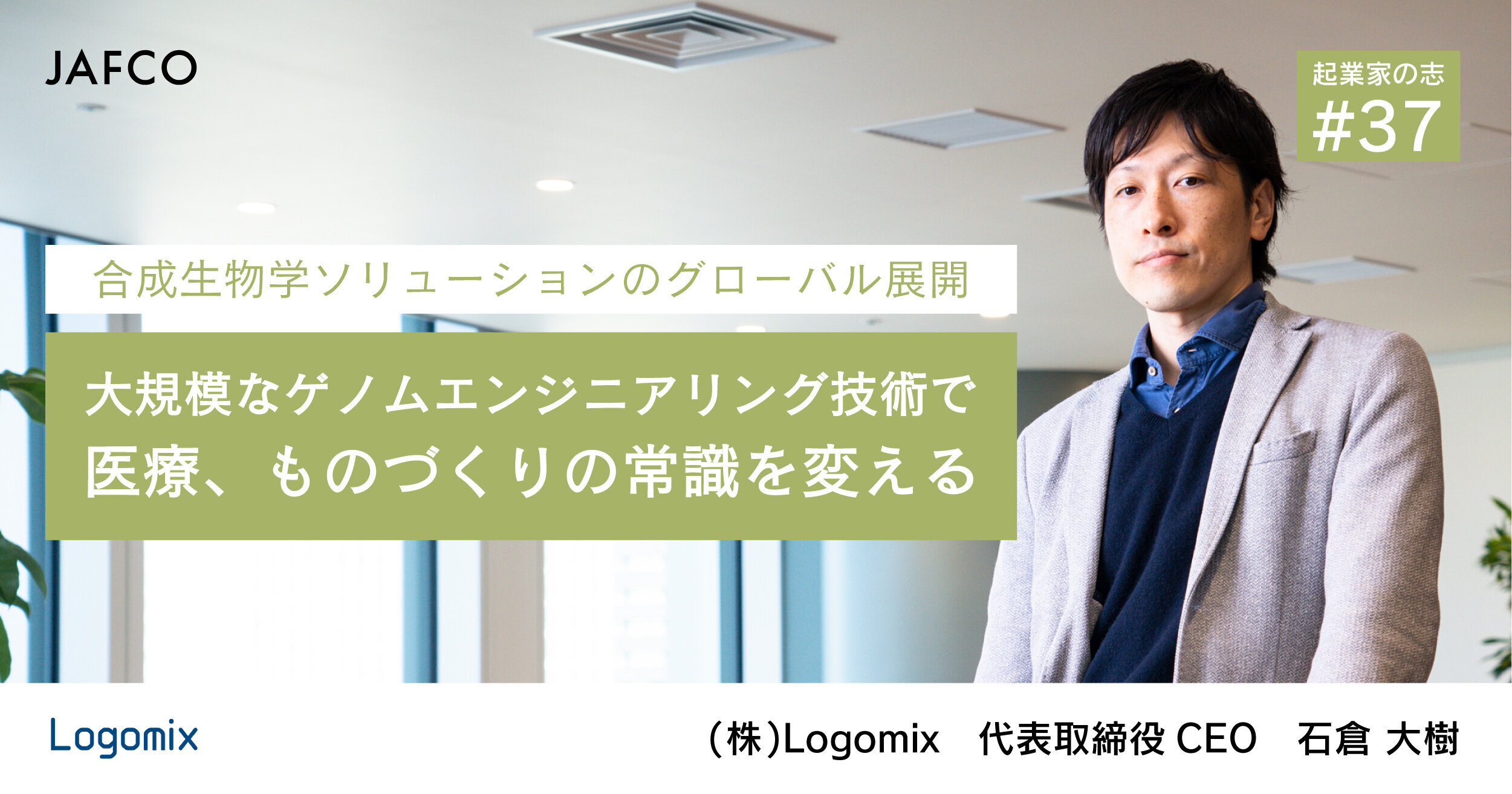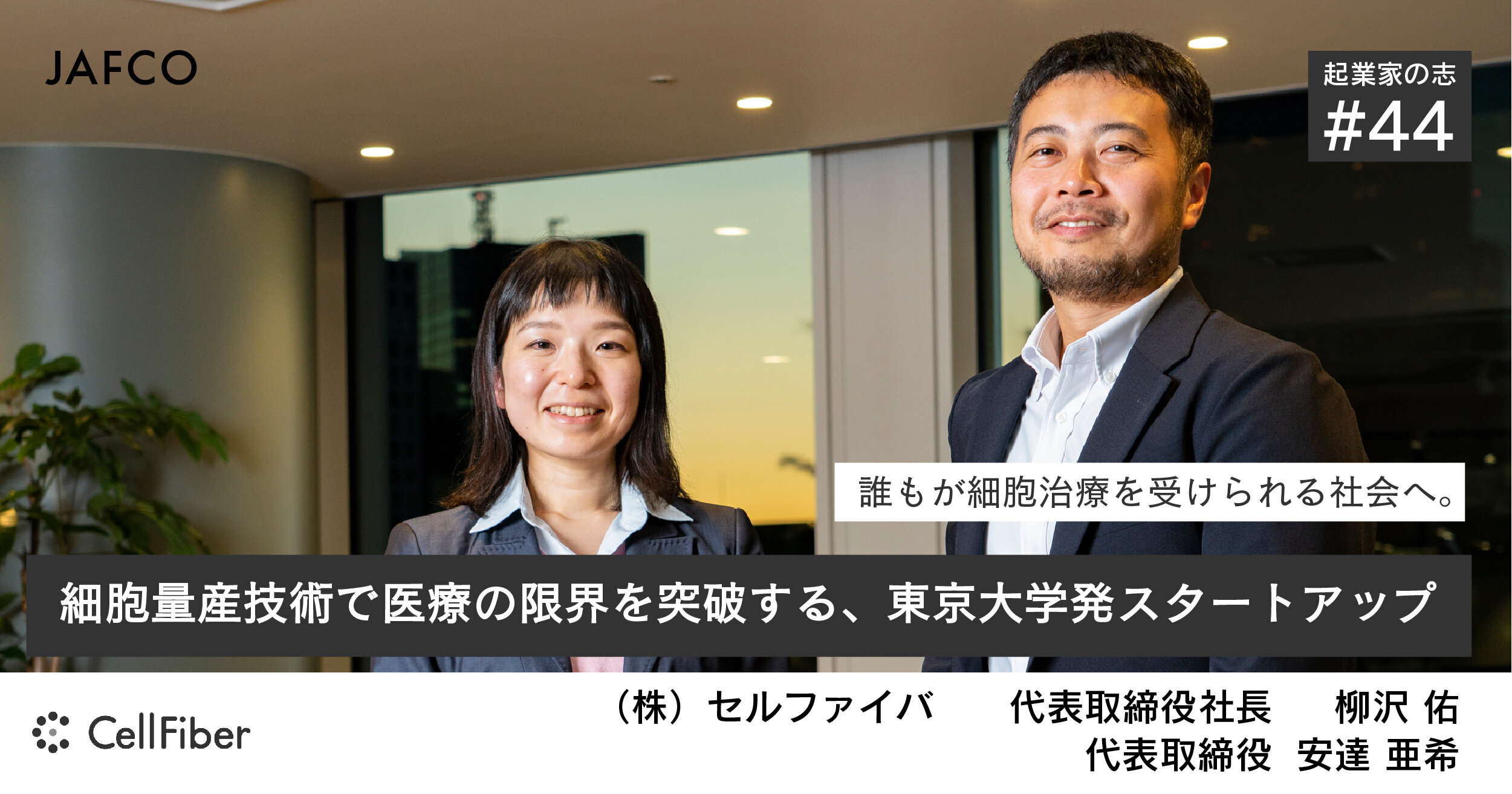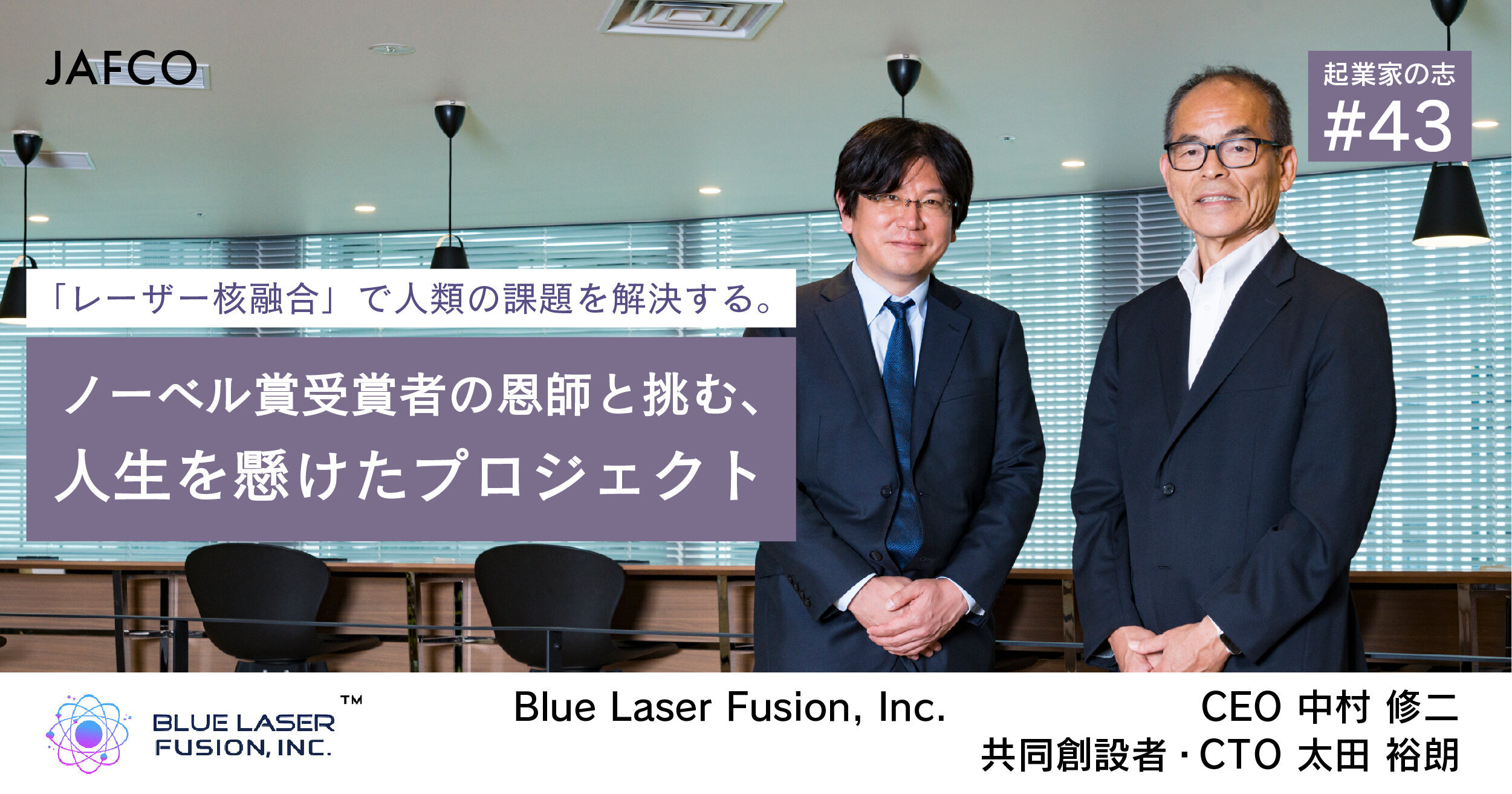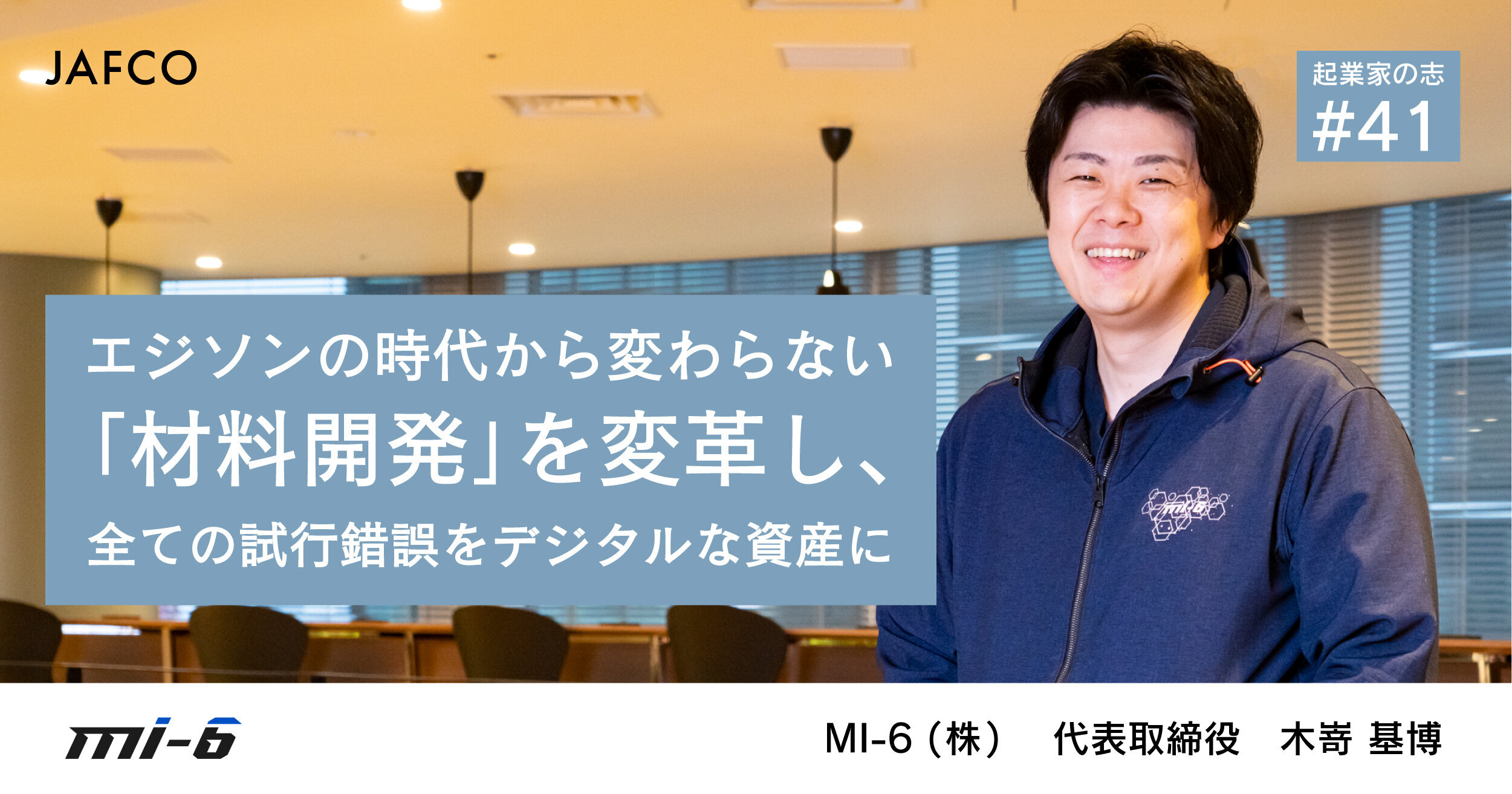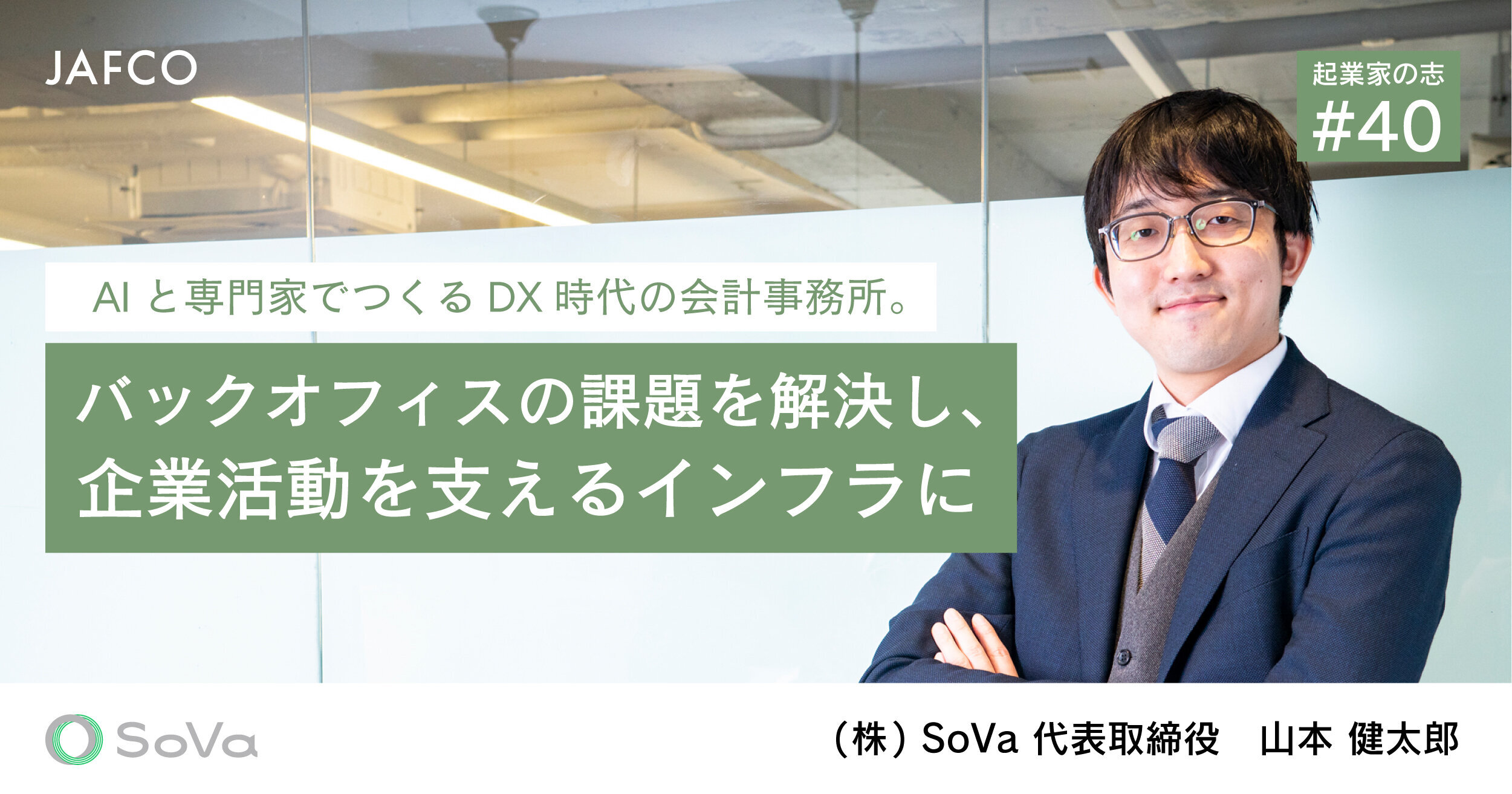"Entrepreneur's aspiration" ;delving into the background of an entrepreneur's decision to start a business, their conflicts until the business gets on track, and their desires to realize through the business.
The 37th edition features, Mr. Daiki Ishikura, Representative Director and CEO of Logomix Inc., talked about his future business pursuits, along with Akifumi Morinaka who talked about his perspective as an investment professional.
【Profile】
Logomix Inc. Taiki Ishikura, CEO & Co-founder
Participated in the founding of a university-originated drug discovery venture while a student at the Faculty of Agriculture, Kyushu University. Engaged in the development of new services in the medical field at M3. After studying at Stanford Graduate School of Business, he worked at P5 and Japan Organization for Medical Device Development (JOMDD) before assuming current position in 2019.
[What's Logomix Inc.?]
A genome engineering company that develops highly functional cells that help resolve issues in drug discovery and biomanufacturing. It provides Geno-Writing™, a large-scale genome construction platform to functionally modify cells and cell systems of various species such as bacteria, yeast, cultured animal cells, and human stem cells.
I saw future potential in the social implementation of biotechnology
―Please tell us about the business of Logomix.
Ishikura Logomix is a bio-venture founded with Professor Yasunori Aizawa of Tokyo Institute of Technology. Our business is based on technologies and expertise that Professor Aizawa has accumulated within the global network of synthetic biology studies through his participation in the international project "GP-write" and "Sc2.0", which aims to artificially synthesize the entire yeast genome.
A genome is the complete set of genetic information, which is the blueprint for any living organism. The biggest feature of Logomix is that it has large-scale genome construction technology that can design and modify genomes on a large scale.
Currently, we are collaborating with 10 partner companies that are promoting manufacturing using cells and microorganisms, such as pharmaceutical companies, chemical and material companies, and energy companies.
The company name Logomix comes from "logogram (= ideogram) + mix", and is derived from the idea of a company that creates new value by combining "functions" encoded in genome sequences.
Geno-Writing™ to design, construct and examine new cellular entity

―Do you think Logomix's innovativeness lies in modifying rather than "discovering" microorganisms that originally exist in nature?
Ishikura In the field of synthetic biology, which we are working on, we are trying to create proteins that the organisms could not originally have by incorporating many genes into the organisms, thereby acquiring a new metabolic system. .
I can't say it's "creating something new", but if I refer the genome editing technology to date as "renovating a building," Logomix's technology may be said to be at the level of "recreating an entire city."
―How will the society change and what will be possible if we can modify genomes on a large scale?
Ishikura There are two major business areas that have a large impact.
First, we aim to contribute to the development of pharmaceuticals using cells in the medical, pharmaceutical, and drug discovery fields. As an example, we are promoting the development of cells that will serve as the base for "cell therapy," which has attracted attention as a new cancer treatment method in recent years. Utilizing our genome construction technology, we would like to promote the development of safe, inexpensive, and highly versatile therapeutic cells, and realize a society in which more patients can receive cell therapy.
Immense possibility of Geno-Writing™

The other is manufacturing areas such as chemicals/materials, foods, cosmetics, and agricultural fertilizers. As an example, by using new host microorganisms such as hydrogen-oxidizing bacteria that can produce substances while absorbing carbon dioxide, we will enhance our lineup of master cells that will serve as the starting point for various industrial cells that will be utilized in various industrial domains.

Since the industrial cells required in each industrial sector are required to have similar characteristics, we have developed master cells with functions that are commonly useful within key industrial sectors using our proprietary genome construction technology. In this way, by developing different master cells for each industrial sector in advance, we can quickly incorporate the individual functions required by each partner company, and quickly supply customized multifunctional cells.
Recently, we have been jointly developing a sustainable amino acid production method with the Ajinomoto Group. By combining Logomix's large-scale genome construction engineering with the Ajinomoto Group's technology and knowledge related to amino acid fermentation, we will develop a sustainable amino acid manufacturing method that reduces the environmental impacts, including CO2 emissions during the fermentation process and aim to manufacture green amino acids by innovating the amino acid production biocycle.
▶︎For more information about the joint development with Ajinomoto, please see this release.
-Please tell us how and why you became interested in synthetic biology in the first place.
Ishikura It was in my third year of high school when I started thinking about a career in the biotechnology field. In high school, my class was for students wanting to go to a medical school, but I was interested in the medical research field, so I thought that if I studied physics, biology, and bioengineering, I would be able to broaden my horizons as a researcher.
Around that time, I heard the news that the United States had announced that it had completed decoding the outline of the human genome sequence, and I remember seeing the future potential of biotechnology and a rapid increase of its social implementation.
-When did you get the idea to start a business?
Ishikura I studied applied biology at university in order to broaden my horizons as a researcher. Initially, I had no interest in business.
At that time, I visited several laboratories in the United States in order to study abroad at graduate school. I happened to come across Genentech in San Francisco, which was called a pioneer of bio-ventures, and at that time, it had only been in business for about 25 years.
Despite this, in terms of market capitalization, it surpassed that of many major Japanese pharmaceutical companies. I was shocked to realize that a company that contributes to social welfare through biotechnology could exist like this! I changed my mind to create a company that could have this kind of impact.
―So that led to the founding of a drug discovery venture while you were in school?
Ishikura There are a lot of genius researchers in the world of research, and I thought I could never compete with those who devoted their lives to creating ideas. I decided to focus on commercializing their technology.
―How did you meet Professor Aizawa of School of Life Science and Technology at Tokyo Institute of Technology, and how did you go about starting Logomix?
Ishikura Before I started my business, I often went to academic conferences and lectures in the biotechnology field where researchers gathered.
I was introduced to Professor Aizawa by an acquaintance at one of those events. When I first met Mr. Aizawa, I was deeply moved by his grand story, and we talked for more than three hours. What was born there is one of the main points of Logomix's business plan.
From 2017 to 2018, research results in the field of synthetic biology began to be published, and Professor Aizawa, who is also a KOL (Key Opinion Leader) in this field, was receiving consultation from more than 10 companies for a new business based on his research.
In order to commercialize his research results, I spent about a year and a half interviewing more than 150 companies how to utilize the professor's research base. More than half of these were overseas companies. I started launching collaborative projects by asking, "If you have such a large-scale genome modification technology, what would you like to use it for?"
Professor Aizawa is committed to solving social issues with his genius creativity, and has an unwavering and strong belief that it is his responsibility to the next generation. Not only when thinking about our company's research strategy, but also when deciding on the areas of focus for companies that come to us for consultation, he overlooks the entirety of innovation in the synthetic biology field and presents various ideas while seriously thinking from the same perspective. In addition, his motto is to work on this process while enjoying it with all his might, and this attitude is also a core value of Logomix. It is very rewarding to be able to work with such a professor.
I want to surprise the world, saying, "The underlying technology for that therapeutic cell belongs to Logomix."
-A total of 500 million yen was raised during the seed stage in June 2022. Please tell us about the background to considering this funding and how you met JAFCO.
Ishikura We could have raised funds sooner, but for the seed round, we thought it better not to raise funds at a stage when we had not achieved all the milestones.
If we receive other people's money early, we may unknowingly scatter our resources before firmly establishing an appropriate organizational culture and process, or lose our direction. In order to prevent this from happening, we decided to raise funds at the stage when we begin to identify the market fit for our technology.
Morinaka The first time I contacted Mr. Ishikura was when Logomix was selected by UTokyo Innovation Platform Co.,Ltd. for its 1st Round Program. I myself have a background in biotechnology and was interested in the area of synthetic biology.
Ishikura I used to think that if I were to talk to someone from JAFCO, it would be Mr. Morinaka. Through connections at my previous job, I once heard from a person at a medical device venture company say he received such and such feedback from Mr. Morinaka when I consulted with him.
Morinaka Is that so!
Ishikura When I finally met him, I felt that he was very knowledgeable in the biotechnology field and has a deep understanding of the market.
Mr. Morinaka has deep knowledge in the fields of drug discovery and cell therapy, and objectively looks at both the potential and risks of the market. I felt that he was very trustworthy because of the accuracy of the points he made during the process of checking business risks.
―From an investor's point of view, what kind of possibilities did you see in Logomix?
Morinaka When considering an investment, we look at the manager, the market, and the technology. Logomix's technology itself is very advanced, but in the world of startups, it's not possible to win on technology alone.
Mr. Ishikura has experience working for startups as well as working overseas, and as a serial entrepreneur, he has also invested in university-launched ventures and medical device ventures.
He was actually taking actions with a clear eye on overseas expansion, and synthetic biology start-ups producing results as of 2021 were rare in Japan. I felt that he had the ability to implement technology in society.
―From your point of view, Mr. Ishikura, what is the advantage of JAFCO among various venture capital firms, and what attracted you about JAFCO after interacting with them?
Ishikura As we have been looking into global expansion from an early stage, many American investors took part in this round of funding, but having JAFCO from Japan gives us a great deal of credibility.
I am also amazed at the speed and accuracy of the information provided by Mr. Morinaka. For example, regarding cell therapy, he gives us feedbacks based on the latest information by saying "There is recent information on this, what do you think about it?" I am very grateful for the kind of information Mr. Morinaka provides us with, which is only possible because of his career and network.
―What do you want to achieve through your business?
Ishikura In terms of the span of the next 10 years, it is to bring the cell therapy products that we are currently developing to the world. There are also expectations for the creation of products that contribute to carbon recycling, so my goal is to ensure that they are properly implemented in society, rather than just being a fad.
And when the product is released to the world, the ideal situation is where everyone is buzzying "the cells used in that treatment are actually based on Logomix technology."
While tackling the issues faced by partner companies from the bottom up, we will work backwards from 10 or 20 years from now to solve them. I find it difficult to find the good balance.
Morinaka Logomix has the potential to build a unique position in the field of synthetic biology. We hope that it will become a global platform foundation in the healthcare and life science fields, and will become the base technology for products based on all kinds of cells and microorganisms.
In Japan, there are almost no companies with a business based on synthetic biology. Logomix has a lot of potential to be in a position where people say, "If you want to ask for synthetic biology, Logomix is the company," and I would be happy if this could come true.
Information, friends, and preparations to get a break are the key
―What is the "entrepreneurial aspiration" that Mr. Ishikura values? Please tell us your message to those who aim to become entrepreneurs.
Ishikura There are many important elements in a startup, such as the market, technology, and team. However, I feel that timing is just as important. Since it is necessary to focus on the future market, not the current market, it is also necessary to quickly grasp changes in the competitive environment, such as emerging new technologies and regulatory changes.
Especially at the seed stage, I think it is very important to have someone, who can provide precious suggestions based on information that can only be accessed by people at advantageous positions, and not information that can be found on the Internet, on your side in order to create a team with high learning ability.

